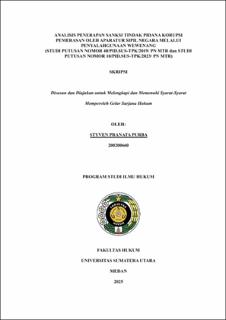Analisis Penerapan Sanksi Tindak Pidana Korupsi Pemerasan oleh Aparatur Sipil Negara melalui Penyalahgunaan Wewenang (Studi Putusan Nomor 40/Pid.Sus-Tpk/2019/ Pn Mtr dan Studi Putusan Nomor 10/Pid.Sus-Tpk/2023/ Pn Mtr)
Analysis of the Application of Sanctions for The Crime of Corruption of Extortion by State Civil(Study Of Decision Number 40/Pid.Sus-Tpk/2019/ Pn Mtr and Study Of Decision Number 10/Pid.Sus-Tpk/2023/ Pn Mtr)

Date
2025Author
Purba, Styven Pranata
Advisor(s)
Syahrin, Alvi
Marlina
Metadata
Show full item recordAbstract
Corruption in Indonesia continues to be a serious problem that hinders the
progress of the country. One form of corruption that often occurs is extortion by
state civil apparatus through abuse of position authority. This extortion is carried
out by forcing individuals or groups to provide personal benefits, either in the
form of money or facilities, in exchange for public services that should be
provided free of charge. This phenomenon creates public distrust of the
government and harms the country's economy. Cases such as those reflected in
Decision No. 40/Pid.Sus-TPK/2019/PN MTR and Decision No. 10/Pid.Sus TPK/2023/PN MTR are clear examples of abuse of official authority by state civil
servants.
This research uses a normative legal method with a descriptive approach. The
data used is secondary data obtained through literature study, analyzed
qualitatively with deductive inference method. This research aims to discuss the
legal provisions regarding the criminal act of extortion corruption with abuse of
authority, the application of sanctions in the two decisions, as well as an analysis
of the judge's consideration of the case in question.
Based on the discussion, it can be concluded that the legal provisions
regarding corruption crimes, specifically extortion by officials abusing their
authority, encompass various forms of crimes such as bribery, gratuities, and
embezzlement. These crimes have serious impacts on public trust and the
country's economy. The imposition of sanctions for these crimes includes
imprisonment, fines, and additional penalties such as the revocation of political
rights. These measures aim to create a deterrent effect and maintain government
integrity. the application of sanctions considers the severity of the offense and its
impact on society and the nation. The judges' considerations in both cases assess
that extortion by public officials undermines the integrity of the office and public
trust, with financial and social consequences detrimental to the country.
Collections
- Undergraduate Theses [3141]
